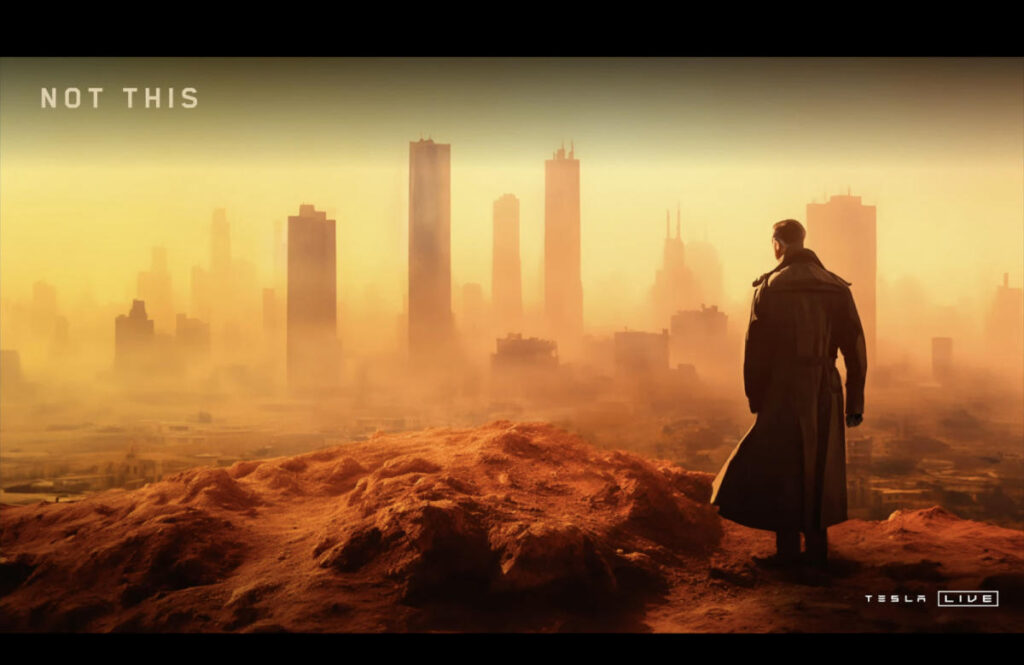In a recent event where Elon Musk unveiled Tesla’s latest innovation, the Cybercab robotaxi, controversy erupted when Alcon Entertainment filed a lawsuit against him for alleged copyright infringement. The lawsuit stems from the use of imagery highly reminiscent of scenes from “Blade Runner 2049,” including a striking visual of a figure in a trench coat set against a stylized backdrop of urban landscapes. The producer of the film accused Musk, Tesla, and Warner Bros. Discovery of unauthorized use of AI-generated images that mirror key scenes from the movie, claiming that this misappropriation aims to enhance the appeal of the product announcement. Alcon had previously denied a request from Musk and his companies to use imagery from the film, indicating that their legal action is rooted in a clear desire to protect their intellectual property.
Alcon Entertainment has characterized Tesla’s use of AI imagery as a deliberate and malicious act, stating that it not only misappropriated the “Blade Runner 2049” brand but also misleadingly linked Tesla’s product to an iconic cinematic universe. According to the complaint, this association heightened the attractiveness of the event to a global audience, effectively exploiting the film’s brand to enhance Tesla’s marketing efforts and, ultimately, its sales. Alcon has claimed that Tesla’s actions represent a severe form of economic theft, given that the producer is in negotiations with other automotive partners for a forthcoming television series, “Blade Runner 2099.” The situation highlights the potential financial repercussions of Musk’s actions and the complexities of intellectual property rights in the era of AI-generated content.
The lawsuit underscores broader implications for brand partnerships in light of Musk’s polarizing public persona. Alcon alleges that any potential partner considering a collaboration with Tesla must navigate Musk’s controversial reputation, which has included politically charged statements and, at times, unverified social media claims. The producer’s legal team articulated concerns that Musk’s behavior might deter companies from associating with Tesla, fearing the negative attention that could arise from such an affiliation. This aspect of the lawsuit points to a more foundational issue surrounding brand integrity and the influence of an individual leader on the perception of a business’s offerings.
Significantly, Alcon’s complaint is not just about the use of a film image but also the perceived financial and reputational damage that could occur from being linked with Musk’s activities. The filing suggests that Musk was aware of Alcon’s prior denial of permission and proceeded regardless, which the company argues constitutes willful misconduct. Alcon’s characterization of Musk’s actions as an “unauthorized misappropriation” indicates a strong stance on their intellectual property rights, asserting that such acts cannot be dismissed lightly in the competitive landscape of both the film and automotive industries.
Interestingly, during the presentation of the Cybercab, Musk made remarks acknowledging his admiration for the “Blade Runner” franchise. However, he also indicated a reluctance towards the dystopian implications tied to the future envisioned in the films. This juxtaposition marks a peculiar irony; while Musk draws inspiration from the cinematic world, he simultaneously faces legal challenges for integrating that world into a commercial context without permission. His appreciation for the franchise does not exempt him from the obligations of copyright law, a reality highlighted by Alcon’s lawsuit.
The legal dispute raises crucial questions regarding the intersection of artificial intelligence, creative expression, and intellectual property. As AI technology advances, the line between inspiration and infringement becomes increasingly blurred. Companies like Alcon must vigilantly protect their creative assets while navigating collaborations and public perceptions influenced by high-profile figures such as Musk. The outcome of this lawsuit may set precedents for future cases involving AI-generated content and may redefine the boundaries of artistic inspiration within the context of commercial branding in rapidly evolving industries.

